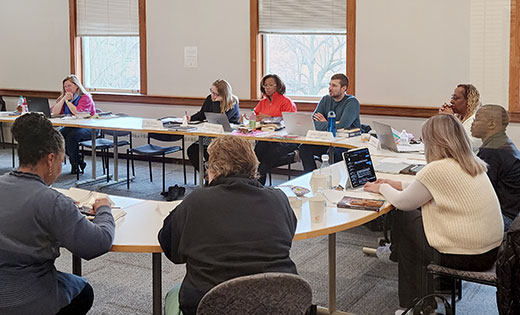Intergenerational Black Church Studies
Hear from Our Faculty
Careers in Black Church Studies
With a Doctor of Ministry in Intergenerational Black Church Studies, students can pursue rewarding careers in faith-based and community organizations, serving as pastors, denominational leaders, and non-profit directors. Students gain academic knowledge and practical tools for impactful, culturally relevant ministry so they can shape policy, address social challenges, and guide congregations with a deep understanding of the Black church’s historical and present-day influence.
Program Details
Explore key elements of the hybrid Doctor of Ministry in Intergenerational Black Church Studies, including the application process, costs, curriculum highlights, and unique cohort schedule.
How to Apply
The intergenerational Black church studies focus accepts applications on a rolling basis. With limited cohort spots, we encourage applicants to apply early for the best chance of admission. Applicants can also request placement on a waitlist if a cohort reaches capacity. Review admission requirements for the Doctor of Ministry degree.
E-mail the admissions team at or call 412-924-1365 for more information about the application process.
Application Deadlines
Priority Deadline: Dec. 3, 2024
Final Deadline: April 21, 2025
Prerequisites
For program eligibility, applicants must hold a Master of Divinity (M.Div.) or an accredited master's degree in a field related to their ministry context.
Cost and Financial Aid
See the Seminary's Cost of Attendance page to learn more about the costs for this DMin cohort.
The Doctor of Ministry degree program offers financial aid and scholarships to support eligible students. One of these opportunities is the Expanding Access to Theological Education Scholarship, which helps cover student tuition, fees, and living expenses.
Note: Federal loans are not available for this program.
Course Topics
Intergenerational Dynamics
Overview of historic intergenerational dynamics in a variety of institutions and movements primarily with Black Christian traditions. Emphasis will be placed on historic, theological, and sociological factors that shaped these dynamics and their importance for understanding Black socio-religious praxis today.
Research Methods Seminar
Introduction to a variety of research methods and practices in practical theology with particular attention to ethnography.
Theological Engagement
This course is an exploration of community engagement and participation in larger social movements as an expression of and as distinct from Black church formal institutional practices. Students will theologically examine social movements through biblical and other historical narratives, implementing a social-political lens and raising questions about how today’s church writes its own history in the context of contemporary movements.
Design Thinking/Ecologies of Ministry
Engagement with current ministry in Black Church traditions with particular attention to aesthetics and materiality and the significance of social context. The course will introduce students to principles of design thinking as a tool to lead congregations in imagining possibilities for ministry in a specific setting.
Black Churches and Scripture
Exploration of engagement with Scripture as a living witness in Black churches with particular attention to practices of hermeneutics and their relationship with sociocultural location.
Proclamation/Witness/Community Literacy
Exploration of forms of sacred proclamation in Black church traditions and how proclamation in these instances, including preaching, artistic, and aesthetic expression, reflects awareness of specific context.
Gender and Black Church Leadership
This course considers gender dynamics in Black church traditions and the significance of gender to Black church conceptions of community and leadership possibilities.
Leadership and Endurance
A consideration of sources of spiritual sustenance offered by Black church traditions and the significance of spiritual practice in ethical formation.
Black Church Responsiveness to Issues
Consideration of some of the most pressing social issues of the present day, the significance of those issues for Black people in the United States, and the role of the church in responding to those issues.
Mobilizing Global Blackness
A consideration of the global reach of current social movements and the place of Black church traditions in that larger ecosystem.
Intergenerational Black Church Final Project
The Intergenerational Black Church Studies focus requires satisfactory completion of a doctoral project and paper which must demonstrate the candidate’s ability to identify a problem, issue, or concern in their own ministry, integrate appropriate theological, biblical, and professional resources, and develop a method for resolution. The doctoral project/paper must reflect depth of theological insight and its positive integration with the practice of ministry. (6 credits)
Online and In-Person Class Schedule
The hybrid Intergenerational Black Church Studies cohort will meet in person for two weeks in January and June, with sessions held in Pittsburgh and at students' ministry sites. This focus will have two mentors—a faculty mentor and a practitioner mentor—who will work together to guide participants. Additionally, a cohort facilitator will host monthly online classes. The 2025 cohort will meet from June 2-6 and June 9-13.
Hear from Our Students
LEARN MORE ABOUT PITTSBURGH Theological Seminary's Intergenerational Black Church Studies Program
Embrace the opportunity to join a transformative community dedicated to leading the Black church forward in an ever-changing world. Apply now to Pittsburgh Theological Seminary’s hybrid Doctor of Ministry in Intergenerational Black Church Studies.





